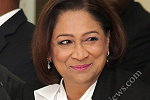By George Alleyne
May 15, 2013 – newsday.co.tt
 The People’s Partnership Government’s deliberate policy of offering jobs to and the eventual hiring of several key members of the media, along with the dangling of additional employment prospects to yet other media practitioners, has been a not too subtle assault on Press freedom.
The People’s Partnership Government’s deliberate policy of offering jobs to and the eventual hiring of several key members of the media, along with the dangling of additional employment prospects to yet other media practitioners, has been a not too subtle assault on Press freedom.
It is a policy whose genesis had been in the run-up to the snap May 24, 2010 General Election and put into effect immediately following the People’s Partnership coalition defeat of the then ruling People’s National Movement (PNM). Admittedly, it would not have been unusual for a Government, for example, to have increased the number of public relations practitioners employed with the various ministries, or to have taken on persons where positions had not existed previously.
What should be understood clearly, however, was that the People’s Partnership coalition administration has not been about creating employment opportunities, with the accent on opportunities, for public relations practitioners, but rather for already employed key media personnel. This has, regrettably, set the stage for some of the other media practitioners, happily only a literal handful, to be tempted into projecting in their news reports an image favourable to the coalition Government.
This can be seen in some of the news articles which contain what are opinions of the writers themselves. In turn, possibly arising out of an arrogant “don’t care a damn” attitude by the Government there have been what had been referred to much earlier in the United States, for example, as “crises in credibility”. There have been official statements which have been dismissive, not only of the truth, but of credibility. So confident has been the People’s Partnership administration.
But as a press secretary to a former United States president, Jimmy Carter — Jody Powell — once stated: “To misrepresent the truth is at the very best an evil to avoid.” Gone are the days when in Europe, for example, freedom of the Press was under brutal siege, what with a tax on newspapers, cynically referred to by concerned citizens as a “tax on knowledge”. If This Column has referred to the European experience it is because the United Kingdom, Trinidad and Tobago’s former Imperialist coloniser, was the last to remove the tax on newspapers, as late as 1861.
In the meantime, tightening the proverbial noose on the Press has not always been as crude and as obvious as in Europe up to the second half of the nineteenth century, but in the targeting both of readership and advertisement revenue. All too often a Government may not see “eye to eye” with the Press and different administrations in the English speaking Caribbean adopted various strategies.
The late Dr Eric Williams, Trinidad and Tobago’s first Prime Minister, had been content to protest to newspaper magnate, Lord Thompson, in 1961, prior to Independence, that a daily newspaper Thompson owned in Trinidad and Tobago, had been hostile to him and provided Thompson with a breakdown of articles he viewed as unfavourable to him, his party, the People’s National Movement, and his Government, along with the overall number of column inches.
In Guyana, then Prime Minister, the late Forbes Burnham, had banned the import of newsprint for a newspaper with whose policy he did not agree, while in Grenada, in the 1980s, the head of Government, Maurice Bishop, a dictator, had banned the publication of newspapers which were opposed to his dictatorial rule.
No curtailing of the freedom of the Press, the right to inform, as evidenced in Guyana and Grenada, should be welcomed as the impression is conveyed that the Government has something to conceal and that other freedoms may be under threat. It was the United Kingdom’s Lord Shawcross, who would note, forcefully, that “the tendency of Governments is to shield themselves behind a curtain of secrecy in which the only window is controlled by a public relations official trained in the art of conveying a minimum of information with a maximum of self-righteousness”.
As the Associated Press Managing Editors (APME) Freedom of Information Committee’s 1975 Annual Report pointed out, journalists were of the view that there was “an equally strong trend toward suppression of government information at the state and local levels”. And while it may be argued that the APME’s 1975 Annual Report was referring to the United States experience, nevertheless it is applicable to Trinidad and Tobago as well.
The People’s Partnership Government 38 years later has contributed to the age old problem through dangling the prospects of well paying jobs to an impressionable few after having wooed more than 30 practitioners away from the media. Freedom of the Press is not an empty phrase. The public has a right to know, a right to be informed and the current strategy by the Government should be condemned.

Obama sought to higher Gupta to the position of Surgeon General. After some thought Gupta declined the position. According to George that would be an “assault” on the media. Shows that anyone today could become a “journalist”. Critical thinking versus fear and suspicion has always been the portion of the propagandist… Posing as defender of Press Freedom.
While I do understand the public’s right to know, there cannot be freedom of the press if the defamation laws are not workable and the judiciary is non-functional. No local newspapers ever correct erroneous reporting of the previous day. No retractions, no apologies, no consideration for those defamed. Until that time when the laws work we should not talk about freedom of the press.
So,let me get this right.George Alleyne is advocating freedom of the press, but not freedom of employment?